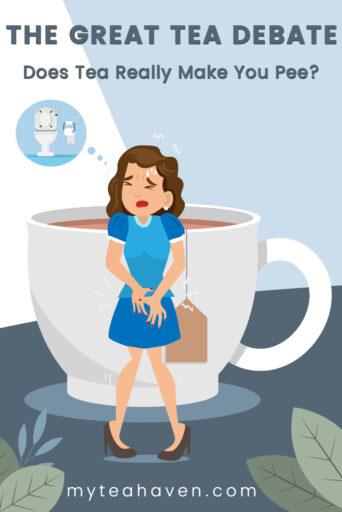The Great Tea Debate: Does Tea Make You Pee?
Does Tea Make You Pee
Does tea make you pee? Well, of course it does. It’s a liquid, and like all liquids, it will send you to the bathroom eventually. But that isn’t really what we mean when we ask that question. What we mean by this question is does tea make you pee excessively? Today we’ll look into the topic of whether tea makes you pee more frequently, understand diuretics better, and learn what can be done to manage frequent trips to the bathroom.
We are a participant in the Amazon Services LLC Associates Program, an affiliate advertising program designed to provide a means for us to earn fees by linking to Amazon.com and related sites. This post may contain affiliate links which means we may receive a commission, at no cost to you, for purchases made using our links. Please see my disclosure to learn more. Unless otherwise stated, all prices are in US$.
Understanding Diuretics

To understand the relationship between tea and urination, let’s first explore the concept of diuretics.
Diuretics are substances that promote increased urine production, leading to more frequent trips to the bathroom. Common diuretic substances include caffeine, alcohol, and certain medications.
Is Tea a Diuretic?
Many people believe that tea acts as a diuretic due to its caffeine content. There does seem to be some scientific evidence to suggest that tea will lead to more frequent urination due to the caffeine in it.
However, other studies have shown that regular tea consumption will not significantly increase urine output compared to equal amounts of water. So ultimately, the answer doesn’t seem to be a simple yes or no.
Factors Affecting Urination
The frequency of urination can be influenced by various factors, not just how much tea you drink. Fluid intake plays a significant role, as consuming larger volumes of liquids naturally leads to more frequent urination. Additionally, individual differences in caffeine sensitivity can impact urination patterns. Some people may experience a stronger diuretic effect from caffeine than others.
Hydration and Tea Consumption
It’s important to maintain proper hydration throughout the day. While tea does contain caffeine, which can have a mild diuretic effect, the hydrating properties of tea outweigh this effect. The water content in tea contributes to your overall daily fluid intake, keeping you adequately hydrated. That being said, it’s essential to balance tea consumption with other non-caffeinated beverages to meet your hydration needs.
Managing Urination Frequency
If you find yourself making frequent trips to the bathroom after consuming tea, there are a few practical tips that can help manage urination frequency.
First, try monitoring your fluid intake by ensuring you’re not exceeding your body’s capacity. Additionally, spacing out your tea consumption throughout the day instead of drinking large quantities at once may help regulate urination patterns.

Tea and Caffeine Sensitivity
Caffeine sensitivity varies from person to person. If you find that caffeine affects your urination patterns or disrupts your sleep, you may consider opting for decaffeinated tea options. Decaffeinated teas provide a milder experience while still offering the flavor and potential health benefits of regular tea.
A Few Final Thoughts
So, as we can see tea’s impact on urination is influenced by several factors. While tea contains caffeine and may have a mild diuretic effect, it doesn’t necessarily make you pee more frequently when consumed in moderation.
By balancing your fluid intake, being mindful of caffeine sensitivity, and monitoring your tea consumption, you can enjoy the many pleasures and potential health benefits that tea has to offer.
Some Questions You Might Have
- Does tea dehydrate you?
No. Despite its mild diuretic effect, tea is primarily composed of water and can contribute to your overall hydration.
- Can herbal teas affect urination?
Some herbal teas, such as dandelion or nettle tea, may have a slight diuretic effect. However, it’s generally minimal and shouldn’t cause significant changes in urination patterns.
- Should I avoid drinking tea before bedtime?
If you’re sensitive to caffeine or find it disrupts your sleep, it’s best to avoid consuming tea or choose caffeine-free herbal teas in the evening.
- How much tea is too much?
The ideal amount of tea varies for each individual. As always, I stress that it’s best to consume tea in moderation. Always keep in mind your overall fluid intake and personal tolerance to caffeine.
- Can tea help with urinary tract infections?
While tea, particularly herbal varieties like cranberry or chamomile, is often associated with potential urinary health benefits, it’s important to consult with a healthcare professional for appropriate diagnosis and treatment of urinary tract infections as they can become very serious if left untreated.







